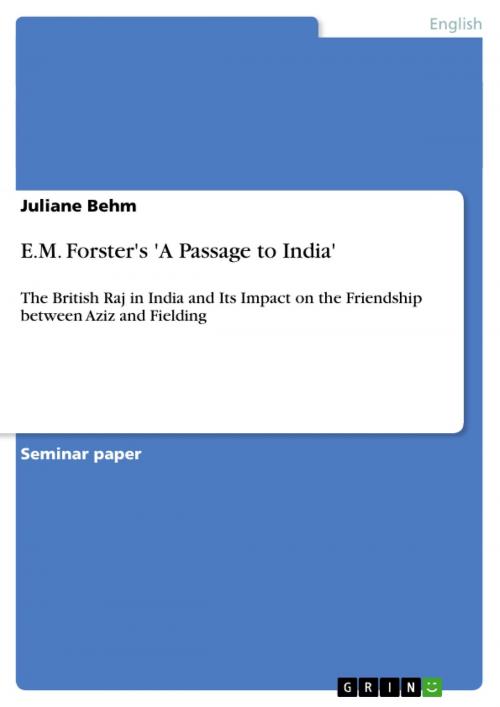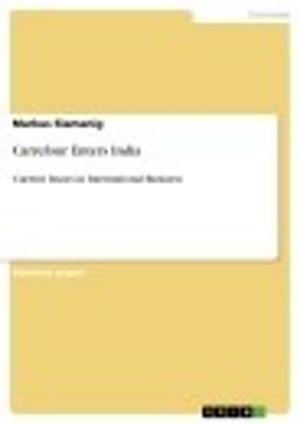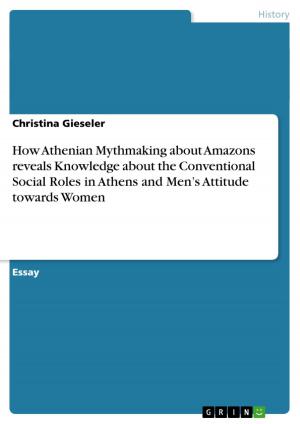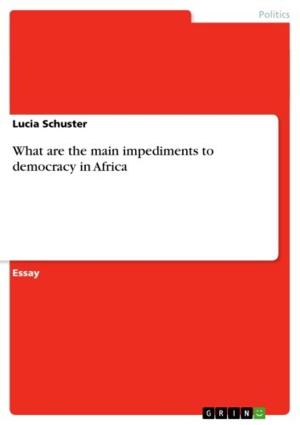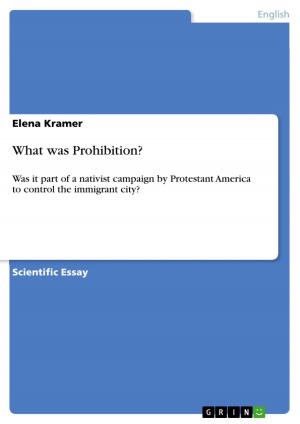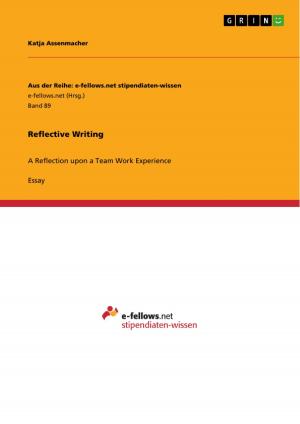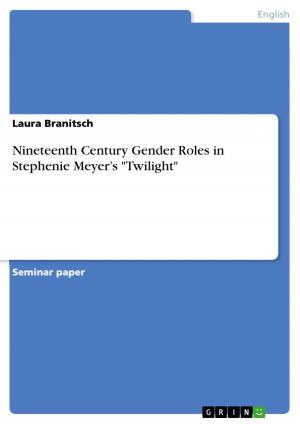E.M. Forster's 'A Passage to India'
The British Raj in India and Its Impact on the Friendship between Aziz and Fielding
Fiction & Literature, Literary Theory & Criticism, British| Author: | Juliane Behm | ISBN: | 9783638023047 |
| Publisher: | GRIN Publishing | Publication: | March 19, 2008 |
| Imprint: | GRIN Publishing | Language: | English |
| Author: | Juliane Behm |
| ISBN: | 9783638023047 |
| Publisher: | GRIN Publishing |
| Publication: | March 19, 2008 |
| Imprint: | GRIN Publishing |
| Language: | English |
Seminar paper from the year 2007 in the subject English Language and Literature Studies - Literature, grade: 1,0 (A), Cummins Memorial Theological Seminary (USA: East Tennessee State University, Johnson City - College of English), course: E.M. Forster, 13 entries in the bibliography, language: English, abstract: 1Introduction E.M. Forster's last novel A Passage to India has been widely appreciated as his most brilliant, most successful, and most valuable work of art. It has received a high reputation as one of the greatest, but also 'most puzzling,' (Allen, 934) modern masterpieces ever written. After its publication in 1924 'it was accorded instant recognition, as a fine novel and as a perceptive and sympathetic treatment of the problem of 'Anglo-India'' (White, 641). In the novel Forster examines racial tensions between the British colonizers and the Indian people at the time of the British Raj and also the philosophical question about the nature of human relationships in general. Despite its great acclaim, it has also been highly criticized and its release gave rise to a political controversy about British imperialism because it was perceived as a clear offensive against the British imperialists. Some literary critics doubt the novel's credibility since it allegedly depicts British officials behaving too cruelly and the relations between British and Indians as unrealistic (Macaulay, 188). Although most criticism focused on its political assumptions, and Forster himself intended to express his scepticism about British imperialism in India and its destroying impact on human personal relationships, it was not predominantly intended to be a political novel. However, 'as a political novel it has had a notable success' (Rutherford, 2). Forster's central purpose is the same as in his preceding novel Howard's End; he is concentrated on the issue of 'connection,' as well as on the desire to overcome gaps of social and racial segregation, and to unify the different races of the East and the West encountering on Indian territory (White, 644). Since 'personal relationships were for Forster a fundamental value... from [which] he deduced the general need for tolerance, good temper, and sympathy' (Rutherford, 6); he maintained the basic assumptions of G.E. Moore's liberal-humanitarian philosophy about the good human character and its longing for personal connection. In A Passage to India, especially in the depiction of the friendship between Dr. Aziz and Dr. Fielding, the longing for connection is not enough to resist racial tensions and misunderstandings. Consequently, their connection is destined to fail at the end of the novel. As a result, A Passage to India also deals with the question 'whether or not it is possible to be friends with an Englishman' (Forster, 10), and with 'colonization as frustrating any chance of friendship between the English and the Indians under the coloniser/colonised status quo' (Baker, 68-69) because it completely prevents the establishment of personal relationships under circumstances of occupation and suppression. In the following discussion the relationship between the British conquerors and the Indians at the time of the British Raj will be analyzed. The relationship of the main characters Dr. Aziz and Dr. Fielding, their attempted friendship, and the cause of its failure will be the focal point of analysis. Finally, Forster's assumption about human relationships under certain conditions, based on the relationship between Dr. Aziz and Mr. Fielding, will be deduced.
Seminar paper from the year 2007 in the subject English Language and Literature Studies - Literature, grade: 1,0 (A), Cummins Memorial Theological Seminary (USA: East Tennessee State University, Johnson City - College of English), course: E.M. Forster, 13 entries in the bibliography, language: English, abstract: 1Introduction E.M. Forster's last novel A Passage to India has been widely appreciated as his most brilliant, most successful, and most valuable work of art. It has received a high reputation as one of the greatest, but also 'most puzzling,' (Allen, 934) modern masterpieces ever written. After its publication in 1924 'it was accorded instant recognition, as a fine novel and as a perceptive and sympathetic treatment of the problem of 'Anglo-India'' (White, 641). In the novel Forster examines racial tensions between the British colonizers and the Indian people at the time of the British Raj and also the philosophical question about the nature of human relationships in general. Despite its great acclaim, it has also been highly criticized and its release gave rise to a political controversy about British imperialism because it was perceived as a clear offensive against the British imperialists. Some literary critics doubt the novel's credibility since it allegedly depicts British officials behaving too cruelly and the relations between British and Indians as unrealistic (Macaulay, 188). Although most criticism focused on its political assumptions, and Forster himself intended to express his scepticism about British imperialism in India and its destroying impact on human personal relationships, it was not predominantly intended to be a political novel. However, 'as a political novel it has had a notable success' (Rutherford, 2). Forster's central purpose is the same as in his preceding novel Howard's End; he is concentrated on the issue of 'connection,' as well as on the desire to overcome gaps of social and racial segregation, and to unify the different races of the East and the West encountering on Indian territory (White, 644). Since 'personal relationships were for Forster a fundamental value... from [which] he deduced the general need for tolerance, good temper, and sympathy' (Rutherford, 6); he maintained the basic assumptions of G.E. Moore's liberal-humanitarian philosophy about the good human character and its longing for personal connection. In A Passage to India, especially in the depiction of the friendship between Dr. Aziz and Dr. Fielding, the longing for connection is not enough to resist racial tensions and misunderstandings. Consequently, their connection is destined to fail at the end of the novel. As a result, A Passage to India also deals with the question 'whether or not it is possible to be friends with an Englishman' (Forster, 10), and with 'colonization as frustrating any chance of friendship between the English and the Indians under the coloniser/colonised status quo' (Baker, 68-69) because it completely prevents the establishment of personal relationships under circumstances of occupation and suppression. In the following discussion the relationship between the British conquerors and the Indians at the time of the British Raj will be analyzed. The relationship of the main characters Dr. Aziz and Dr. Fielding, their attempted friendship, and the cause of its failure will be the focal point of analysis. Finally, Forster's assumption about human relationships under certain conditions, based on the relationship between Dr. Aziz and Mr. Fielding, will be deduced.
